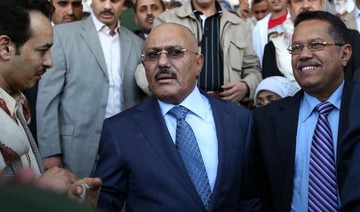SANAA: Yemeni forces backed by the Arab coalition have intensified their efforts to retake Yemen’s port city of Hodeidah from the Iranian-backed Houthi militias, Yemeni officials and witnesses said on Saturday.
Hodeidah is an important port city as it serves as the nation’s main gateway for food shipments.
With battles raging at the southern side of Al-Hodeidah International Airport, the Yemeni military said it had entirely seized the facility, and that engineers were working to clear mines from nearby areas just south of the city of some 600,000 people on the Red Sea.
“The armed forces which are supported by the Arab coalition have freed the Al-Hodeidah International Airport from the Houthi militias and the engineering teams have started to clean the airport and its surroundings from mines and bombs,” the military said on its official Twitter account.
Sadek Dawad, a spokesman for the Republican Guards force allied with the coalition, said the government forces had battled onto the airport grounds.
Dawad also said the southern gate of Hodeidah city was captured by pro-coalition forces.
“The military operations to liberate the city of Hodeidah will not be stopped until we secure the city and its strategic port and that won’t last too long,” he told The Associated Press.
Houthi militias, who hold the country’s capital of Sanaa, did not immediately acknowledge losing the airport.
The Houthi-run Al Masirah satellite news channel aired footage it described as being from near Hodeidah showing a burned-out truck, corpses of irregular fighters and a damaged Emirati armored vehicle. The Iranian-aligned fighters rifled through a military ledger from the vehicle before chanting their slogan: “Death to America, death to Israel, damn the Jews, victory to Islam!”
Yemeni officials and witnesses said forces from the UAE-backed Amaleqa brigades, backed by air cover from the coalition forces, were heading to eastern Hodeidah province to attempt to cut off the main road that links it with the capital, Sanaa.
The officials said if government forces capture the Kilo 16 Road they would trap the Houthi militias in Hodeidah and the western coast and prevent them from receiving supplies from the capital. The Houthis are then expected to have no choice but to head to the northern province of Hajjah.
The officials spoke on condition of anonymity because they were not authorized to brief media and the witnesses for fear of reprisals.
The Norwegian Refugee Council said humanitarian agencies could not reach the southern part of Hodeidah as fighting escalated.
UN Special Envoy Martin Griffiths, meanwhile, arrived in Sanaa in an effort to broker a cease-fire.
The Arab military coalition began its assault Wednesday on Hodeidah. Emirati forces are leading ground forces mixed with their own troops, irregular militiamen and soldiers backing Yemen’s government. Saudi Arabia has provided air support, with targeting guidance and refueling coming from the US.
Some 70 percent of Yemen’s food enters via the port, as well as the bulk of humanitarian aid and fuel supplies. Around two-thirds of the country’s population of 27 million relies on aid.
The coalition said it had no choice but to launch the assault as the port provided millions of dollars for the Houthis through customs controls. They also accuse the Houthis of using the port to smuggle weapons through, something a UN panels of experts described in January as “unlikely” as incoming ships require UN permission and are subject to random searches.
The UN and Western nations say Iran has supplied the Houthis with weapons, from assault rifles to the ballistic missiles they have fired deep into Saudi Arabia, including at the capital, Riyadh.
Aid agencies and the UN evacuated international staff from the city ahead of the offensive. Some of the wounded able to flee are driving onto Aden, some 315 kilometers (195 miles) away, after being stabilized at a hospital in Mocha on the way, the aid group Doctors Without Borders said. The local hospital in Hodeidah already is struggling to help the wounded, the group said.
Thousands remain besieged in the city and around the airport due to the fighting.
The Houthis seized control of Sanaa in September 2014, later pushing south toward the port city of Aden.
The Arab military coalition entered the conflict in March 2015. The Houthis, meanwhile, have laid landmines killing and wounding civilians, targeted religious minorities and imprisoned opponents.
French forces
French special forces are present on the ground in Yemen with forces from the UAE, French newspaper Le Figaro reported on Saturday, citing two military sources.
The newspaper gave no further information about their activities. The Defense Ministry was not immediately available for comment, but its usual policy is not to comment on special forces’ operations, according to Reuters.
A French parliamentary source recently told Reuters French special forces were in Yemen.
The French Defense Ministry said on Friday that France was studying the possibility of carrying out a minesweeping operation to provide access to the port of Hodeidah once the coalition had wrapped up its military operations.
The ministry stressed that France at this stage had no military operations in the Hodeidah region and was not part of the Arab coalition.
France, along with the US and Britain, backs the Arab coalition in the Yemen conflict.



























